The Alien archive
Greetings Earth dwellers, and thank you for visiting our Alien archive!
Perhaps your great, great, great grandpar ents were aliens...
ents were aliens...
Do you have alien DNA?
Inspired by Jehovian, whose article 'Theory of aetiology of Asperger's' was featured in Issue 95 of the Spectrum, we've compiled a collection of intergalactic features on the topic of aliens and alienation.
Aliens and the concept of being from out of space is often used as a way of describing how it feels to be autistic. Of course, not all autistic people necessarily relate to this idea.
We've had some fantastic submissions on this universal theme (both literally and figuratively!) throughout the years. We hope you enjoy the read!
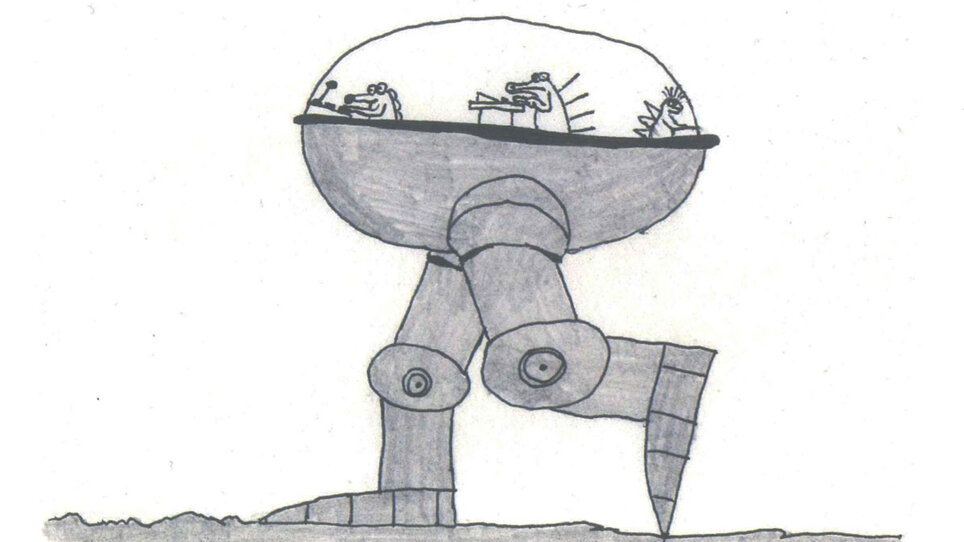
Art by Duncan, issue 79
Alien articles
-
Extraterrestrials. Do they exist?
Many people say no, but, equally, quite a few (such as myself) say yes. Why? Because the notion that we, human beings, are the only natural and intelligent beings in the entire and limitless Universe is quite beyond my credulity and comprehension. I cannot conceive of a Universe in which ETs do not exist. Therefore I take it for granted that they do exist, like many other people who accept the reality of ETs, as a given.
With respect to ETs, there are many narratives regarding their nature. Not only in respect of their deduced existence (as above) but there are also narratives from (human) witnesses who claim to have encountered them (and to have encountered their spaceships). These latter narratives are predicated upon the reality of ETs having visited planet Earth, where they encountered us, human beings. If ETs do exist then there is no intrinsic reason why they cannot have encountered us!
If encounters between ETs and human beings have occurred, then they must have occurred here on planet Earth - namely the only place in the Universe where we are to be found. We human beings are the only natural, intelligent beings native to the whole of our Solar System. Therefore, ETs encountering us here on planet Earth must have travelled from other stellar systems. Either in our own galaxy, the Milky Way, or from some other galaxy altogether. This, then, demonstrates that ETs have perfected the means for intra-galactic or inter-galactic space travel. This means that those ETs who have visited us must be possessed of some very advanced science and technology. Compare them with us human beings, who have only been able to travel as far as our satellite, the Moon, and who must be endowed with vastly superior knowledge and intelligence compared to that of us, human beings.
In many ways we human beings are very primitive and lacking in true intelligence (witness our inability to establish a stable, commensal relationship with our natural environment: to the contrary, we, needs-must, make our relationship with the environment exploitative). No matter, we certainly have developed a highly efficient and effective method for propagating our species.
Indeed, such a method that is widespread throughout nature, especially in most areas of the animal kingdom (of which, of course, we are a part), namely, sexual reproduction. Given the manifest success of sexual reproduction as a method of propagating ourselves, it would not be surprising if ETs (their being so much more intelligent than us) should use the same method for reproducing themselves. And if ETs can comfortably exist here on planet Earth, when they have visited us, why should they not then have had sexual intercourse between themselves here, as well as their having had sexual intercourse on their own planets and on their spaceships? I believe that there is no reason to suppose that the contrary is true.So, if ETs and we human beings use the same method for reproducing ourselves then why should not ETs and human beings have sexual intercourse between themselves? I can see no reason why not, at all! After all, there is a precedent set for such a practice, here in the animal kingdom on planet Earth. A precedent of cross-species reproduction which produces a hybrid species. Namely, the mating of a horse and a donkey, which produces a mule.
My belief is that ET-human matings did happen, which left a component of ET genetic material in the human gene pool. And that this component has been progressively passed on (through normal human sexual reproduction) from generation to generation. Getting, in the process, progressively more and more attenuated. At this point I wish to state the following: namely that, in two crucial aspects, ETs are, were, different from us. They are of an entirely different species and of an entirely different animal kingdom, and are vastly more intelligent than us. Unlike us human beings they are, were, replete with knowledge and we’re woefully deficient in wisdom!
This is where Asperger syndrome (and other forms of high-functioning autistic spectrum disorders) come in...
I have AS. I believe that one of the principal reasons why I have this disorder is that I have inherited a significant element of ET genetic material, which means that, mentally and interpersonally, I am not completely human. I am actually partly ET. And that means that ordinary human beings (that is, neurotypicals) are rather alien to me. And vice versa. So it is not surprising that I, and they, have mutual difficulties in social interaction. And just why we have such difficulty in understanding one another, for we are of different species and of different races. Finally, of course, ET genetic inheritance would explain the higher-than-normal intelligence of the human being with AS.

-
Like a lot of Aspies I have had my fair share of obsessions. Currently it's Doctor who and Video game high school, (a show that is on Netflix). I have every Doctor Who book that has been published as well as every new season, as well as the anniversary DVDs from the classic years. I live, breathe and I'd eat Doctor who? if I was able to. One shelf of my bookcase is dedicated to Doctor who DVDs, whilst another bookcase is filled with the new series adventure books and I have found myself in a dilemma as to where my DVDs of Peter Capaldi live, as he is the new doctor. I have posters on my wall and scour the Internet for anything to do with Doctor who.
To me life without the Doctor in any way shape or form would be unbearable. I know that a lot of people who are on the autistic spectrum find themselves with a liking to the Doctor. But why?
It is a question that I have been asking myself for ages and am unable to get an answer to. The Doctor can go anywhere in space or time, can be young or old and can save anyone and defeat everyone. But why does this time-travelling "madman with a box" manage to capture the hearts of most Aspies?
As we all know, we hate a change in anything, but in Doctor who change is always in the shadows. We know that, sometime in the future, the companions will change, and we also realise that in time the actor playing the Doctor will change, but we still watch and wonder at this creation. We are glued to every episode and every prequel with baited breath, we gather as much info as we can and we wait, we wait for the glorious day that Doctor who is back on the TV.
Recently there was an article in the papers about a little autistic girl who was really worried and upset that her hero had changed . This little girl used to go on loads of adventures with the Doctor and Clara and, when she heard that the Doctor was changing, was worried that the new Doctor wouldn't like her and wouldn't want to come on adventures.
This little girl was lucky enough to be in Cardiff when she came across the filming of the new series and was even luckier to be introduced to Peter Capaldi, and Jenna Coleman where her mum explained that she was a massive fan but was worried that the new Doctor wouldn't like her or go on adventures. Instead of dismissing this little girl the producer introduced her to Peter and Jenna, who (according to the reports of her mum and other family members) took the time to talk to her, even though her autism meant that she would not talk to them.
In fact (and again I have only seen this in the video) both Jenna and Peter made sure that the little girl was as comfortable as possible. Both got down to her height and both talked to her like she was the only child in the world, they saw her a fan not a fan with autism. Having explained her problem to Peter Capaldi, he got out his phone and still talking to the little girl went through his pictures until he came to one of himself, Matt and Jenna. He then proceeds to tell this little girl that he has been given permission of Matt Smith himself to play the Doctor and that there will be change in the series, but that some change can be good. He then asks if he has the little girl's permission to play the Doctor, reassuring her that although another actor has taken Matt's place, he is still the Doctor and that she can continue on her adventures through time and space with the Doctor and Clara.
Doctor who is all about change. The Doctor changes where he goes, he changes his companions, he changes history, and he changes his face, and as people on the autistic spectrum we can understand that. Change is inevitable, it happens whether we like it or not, as Aspies we change our obsessions, sometimes on a daily basis, sometimes weekly and sometimes never. As we mature, our tastes change and what was once our full obsession is put on the back burner. We can have boxes and boxes full of things that we collected when we were last obsessed with something. I know that at the moment my "love" for Videogame high school is costing me some serious money, with buying items from the United States as well as having some serious shares in Amazon and the BBC shop due to all the money I spend on Doctor who.
Yes, our obsessions are laughable to everyone else, but to us they are serious and very much loved. It is our comfort in a world where nothing makes sense to us, where social chat is a foreign language and the basic body language can leave us feeling left out and stuck in a Wonderland. Our obsessions save us from having to negotiate tricky problems, as no one can take them away from us. If Doctor who is not on TV, we are able to watch his adventures over and over again on DVD, read about his adventures due to the books and process information about him that no one else but a serious Whovian would care to know about.
An obsession to an autistic person is a warm cuddle in a world of difficulties and noise. I know that if places get too loud for me, I go through the Doctors in my head as a way of calming me down. It's a way of getting through the aspects of a NT life in an Aspie way. Yes, people who are NT think we are strange, but we think that they are strange: why can't they see the aspect of watching only Doctor who, trains, etc. is comforting and enjoyable? To Aspies coping with NT life, it is difficult enough and so we rely on our obsessions to get us through the day, week, whatever. Life is stressful enough as it is, so maybe, just maybe, we should show our obsessions with pride. Who knows, the next regeneration of the Doctor might be autistic!


-
Dear the Spectrum
I enjoyed the Doctor Who special! It was good reading Laura’s article and the story about Peter Capaldi, Jenna Coleman and the little girl with autism very nearly made me cry. What lovely people they are, and what a lucky little girl! I’ve watched (and loved) all the episodes since the relaunch, but only fairly recently have I started watching from the very beginning. I’m onto the second Doctor (Patrick Troughton) now, but William Hartnell as the first Doctor was amazing. A bit like watching your own, rather eccentric, grandfather travelling through time. Plus, you have to love the fluffed lines, wobbly sets and man-in-a-costume aliens! So far Matt Smith and Karen Gillan are my favourite pairing: the Amy Pond storyline was brilliant. I miss her so much!
In her article Kim was wondering why the Doctor is so popular with Aspies. I wonder if it’s because he’s an alien. When he visits Earth he doesn’t really understand humans and their emotions. The human companion is always there to provide the emotion in the stories. I think us Aspies probably relate to him feeling like a stranger amongst people, in his case a literal alien.
On a different note, I read the plea from Tim about the Asperger support group in Essex. I’ve always found the idea of an Asperger social event to be a bit of an oxymoron. Maybe you can’t get your members to attend social events because they have a social disability and wouldn’t enjoy social events - I know that I personally avoid them like the plague! Maybe you could send out an email or letter to all of your members asking if there any activities they would like to do, maybe in smaller groups? I hope you can get some sort of advice from other readers.
Cathy


-
I know my origins are elsewhere and I must have a purpose for being here, but I long to be returned to my home.
I see opportunities in the sky but they pass by too far to hear me. Too distant to sense that I am waiting. Unaware that I am in need of assistance, of help to move on, to understand why I am here and what I should be doing.
I am increasingly aware that I see things differently to other people. I notice things they seem blind to. Nuances in life seem to pass others by, where as I am subjected to an overload of feelings and images. Even my dreams are like waking in their vividness. And it hurts. I long for the ignorance, the lack of subtlety that plagues the human world. A release and an end to this bombardment.
But do I? Maybe not. Maybe it is better to be aware. Subtleties in life need to be appreciated, not ignored. Enjoyed not dismissed. I have a gift, perhaps. I should embrace it and be strong. If I can.
So, it seems, the longer I remain here, the more confused I get by the human race. And the more sensitive I am becoming to it. It is difficult to remain without wanting to hide away, to cut myself off from the chaos that pervades all corners of the Earth in this time.
I know I am not alone on this world, though it feels like I am so much of the time. There are others like me. We may be legion. I hope we are.
As far away as it may be, in time and in space, I still hope for the chance to go home.


"I know my origins are elsewhere and I must have a purpose for being here, but I long to be returned to my home."


Alien artwork
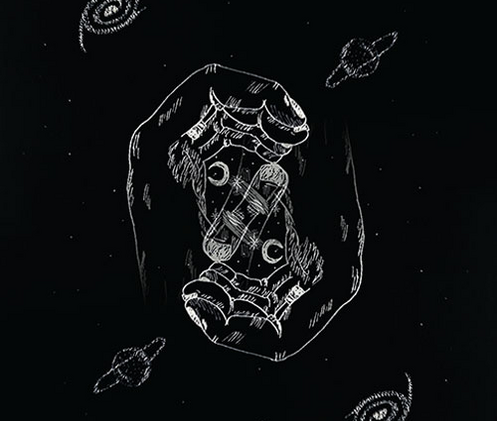
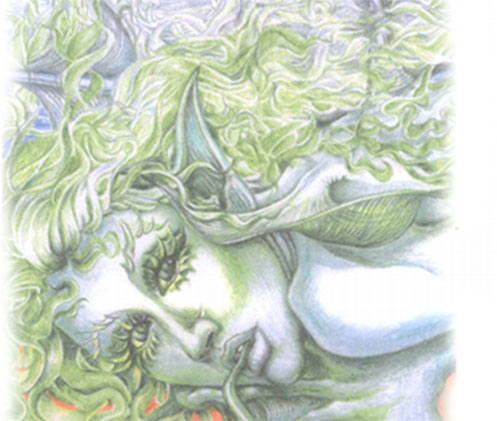
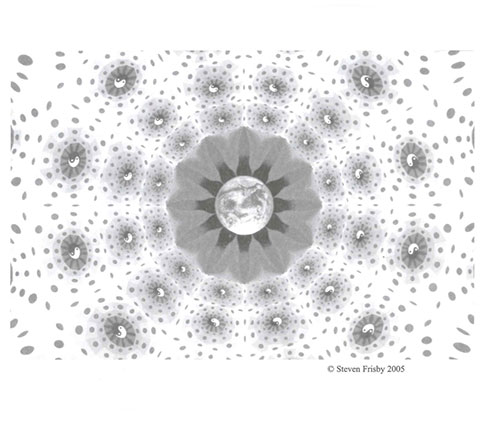
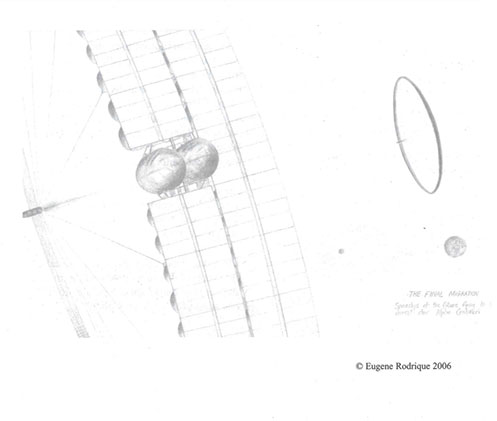
'The Final Migration' by Eugene
the Spectrum issue 51, July 2006
Calling all contributors!
We want to share the amazing archive of autistic prose, poetry and art that is the Spectrum magazine. If anyone who contributed to the magazine doesn’t want their work to be reproduced, please email us at content@nas.org.uk and we will remove it.

Subscribe to the paper magazine
A subscription will pay for four issues of the Spectrum magazine, delivered straight to your door. Visit our online shop to order your subscription today.

Submit work and our rules
Whether you have an article, piece of artwork or a poem you would like to be considered for inclusion, please send it in and it could appear in a subsequent issue.
Find out more